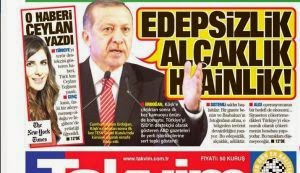Last Friday, after 92 days of being imprisoned, the
Editor-in-Chief of the Turkish opposition daily Cumhuriyet, Can Dundar, and his
colleague, journalist Erdem Gul, were released pending trial. This came upon a surprise decision by Turkey's
Constitutional Court's ruling that their rights had been breached. The
two journalists were jailed 5 months after the newspaper released a story
on a secret Turkish arms transfer to Syria. If found guilty the two could face life imprisonment.
In January 2014 the story first made headlines as Turkish prosecutors demanded the seizure of the secret arm shipment, which the Turkish government had claimed was humanitarian goods. All state authorities who took part in the raid were later jailed or purged from their work accused of numerous crimes related to espionage and staging a coup against the government.
Are you on way to the newspaper? A smiling Can Dundar: Its really late-I suppose later on tomorrow we will be there. pic.twitter.com/DNchxQsosB— Louis Fishman (@Istanbultelaviv) February 26, 2016
In January 2014 the story first made headlines as Turkish prosecutors demanded the seizure of the secret arm shipment, which the Turkish government had claimed was humanitarian goods. All state authorities who took part in the raid were later jailed or purged from their work accused of numerous crimes related to espionage and staging a coup against the government.
 |
| Can Dundar-This picture originally appeared in Todays Zaman |
In fact, it was Erdogan who opened the criminal investigation against him, demanding a life sentence, stating that Dundar would pay the "highest price" for his actions. Already late in 2014, a case had been opened against Dundar for defaming Erdogan and his son, Bilal. Last December, however, while imprisoned for the Syrian arms transfer story, he was found innocent on the charge of defamation, much to the dismay of the president.
As
people gathered last Friday evening at the Silivri prison gates awaiting their release, they ended up having to wait until
3:00 am, thus coinciding with Erdogan's birthday. Dundar seized this
opportunity to take a jab at the Turkish president, cynically stating that he was sorry that his friends had to wait
so long but his February 26th release was well-timed as a birthday present for Erdogan.
Well, Erdogan has taken their public quarrel to a new level all together. On Sunday he stated the following shocking words, "I will remain silent to the decision the court has given. But I don't need to accept it, I want to make that clear. I don't obey or respect the decision…this has nothing to do with press freedom. This is a case of spying."
In other words, the spat between the two now has the Turkish president openly defying the Constitutional Court.
Dundar seems poised to continue on with his struggle, now addressing Erdogan in an open letter, where he thanks him for sending him to prison, explaining how the prison has made him a better person and writer, in addition to showing the world the authoritarian shift taking place in Turkey. According to Cumhuriyet, the article has had a record 4 million hits.
What is clear is that the stakes could not be higher and that this saga is far from over, not to mention the fact that according to the Committee to Protect Journalists, "Turkey remains the worst jailers of the worldwide," and that Dundar and Gul could once again find themselves behind bars for a very long time. For now, only time will tell....
Well, Erdogan has taken their public quarrel to a new level all together. On Sunday he stated the following shocking words, "I will remain silent to the decision the court has given. But I don't need to accept it, I want to make that clear. I don't obey or respect the decision…this has nothing to do with press freedom. This is a case of spying."
In other words, the spat between the two now has the Turkish president openly defying the Constitutional Court.
Dundar seems poised to continue on with his struggle, now addressing Erdogan in an open letter, where he thanks him for sending him to prison, explaining how the prison has made him a better person and writer, in addition to showing the world the authoritarian shift taking place in Turkey. According to Cumhuriyet, the article has had a record 4 million hits.
What is clear is that the stakes could not be higher and that this saga is far from over, not to mention the fact that according to the Committee to Protect Journalists, "Turkey remains the worst jailers of the worldwide," and that Dundar and Gul could once again find themselves behind bars for a very long time. For now, only time will tell....


